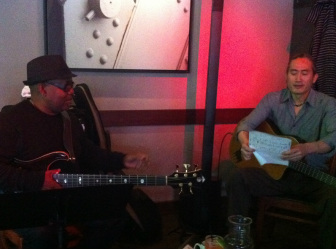
Victor Little and Toshi Onizuka
Toshi Onizuka knows how to strike when the opportunity is hot because when Victor Little makes it back to his hometown of Portland, he makes the best of it. From a very hot concert called Victor Little and Friends, Past and Present on Friday, April 27 to Jimmy Mak's on Saturday to the Paragon on Sunday afternoon, Victor played magnificently with his Portland favorites.
When it was told that Victor would be with Toshi Onizuka and Reinhardt Melz on Sunday, it was clear that this was a treat not to be missed. Victor and Toshi were fantastic together on the Bitter Smile and Espresso tracks from Toshi's latest CD, When You Passed By. Sunday at the Paragon would provide an opportunity to see Toshi, Victor and Reinhardt Melz delve into other Toshi originals in addition to other classic Spanish and bossa nova tunes. And so it turned out.
It all began with Blue Bossa, the jazz standard that combines bossa nova with a hard bop. This was also a track included on Toshi's latest CD and Victor took to it with his usual skill and grace. Toshi seemed to kick into blues in yet another example of Toshi's example of the Zen teaching "You can never enter the same river twice." The riverbanks may be defined and the direction of the current may be established, but the water you wade into is never the same. In Toshi's playing, the time might be the same and the chords may be set, but the variables always make for a different experience. The truth is that even the times and chords may get shifted to suit what Toshi senses is right for the moment. A philosophy worth investigating.
Reinhardt plays it in the same way. As Victor holds the steady bass line, Reinhardt switches from brushes to sticks back to brushes, always perfecting the sound for the setting. Then Victor is given a solo and the five-stringed bass releases such smooth emotion as Toshi takes up the accompaniment.
This is the temptation, to watch the soloist so intently that one misses what the others are doing. I always enjoy watching a movie's background characters and action. Watching the integrity of supporting actors is the sight that gets me the most. To see how a performer carries on when the spotlight is on someone else is one of the real joys of watching art. I remember watching Jamal Wilkes moving without the basketball, or Cal Ripken, Jr. repositioning himself just before the pitch, or Toshi Onizuka switching to a support role as he makes space for Victor or Reinhardt. He is generous but he is not idle.
In performing The Girl from Ipanema, Toshi switched up the time to 6/8. Victor looked over, wide-eyed, at Reinhardt who smiled back knowing that working with Toshi is an adventure in sonic exploration. Last week, Toshi was performing Agua de Beber and I barely recognized the song. I mentioned to him later that I had no idea where it was going and he laughed and said, "Neither did I for a minute." He said that to elecit a laugh because one always has the feeling that Toshi knows exactly where he is going.
It is wonderful to hear well-worn songs done so refreshingly new and alive. Old songs under new arrangements make for new songs and new experiences. And Toshi is accompanied in lock-step by Victor and Reinhardt. Part of the fun was watching Victor responding to the new direction as he sat during his solo with his heels clicking together like Dorothy trying to get back to Kansas. But Victor was right at home the whole time because he can follow a groove like few can.
When it was told that Victor would be with Toshi Onizuka and Reinhardt Melz on Sunday, it was clear that this was a treat not to be missed. Victor and Toshi were fantastic together on the Bitter Smile and Espresso tracks from Toshi's latest CD, When You Passed By. Sunday at the Paragon would provide an opportunity to see Toshi, Victor and Reinhardt Melz delve into other Toshi originals in addition to other classic Spanish and bossa nova tunes. And so it turned out.
It all began with Blue Bossa, the jazz standard that combines bossa nova with a hard bop. This was also a track included on Toshi's latest CD and Victor took to it with his usual skill and grace. Toshi seemed to kick into blues in yet another example of Toshi's example of the Zen teaching "You can never enter the same river twice." The riverbanks may be defined and the direction of the current may be established, but the water you wade into is never the same. In Toshi's playing, the time might be the same and the chords may be set, but the variables always make for a different experience. The truth is that even the times and chords may get shifted to suit what Toshi senses is right for the moment. A philosophy worth investigating.
Reinhardt plays it in the same way. As Victor holds the steady bass line, Reinhardt switches from brushes to sticks back to brushes, always perfecting the sound for the setting. Then Victor is given a solo and the five-stringed bass releases such smooth emotion as Toshi takes up the accompaniment.
This is the temptation, to watch the soloist so intently that one misses what the others are doing. I always enjoy watching a movie's background characters and action. Watching the integrity of supporting actors is the sight that gets me the most. To see how a performer carries on when the spotlight is on someone else is one of the real joys of watching art. I remember watching Jamal Wilkes moving without the basketball, or Cal Ripken, Jr. repositioning himself just before the pitch, or Toshi Onizuka switching to a support role as he makes space for Victor or Reinhardt. He is generous but he is not idle.
In performing The Girl from Ipanema, Toshi switched up the time to 6/8. Victor looked over, wide-eyed, at Reinhardt who smiled back knowing that working with Toshi is an adventure in sonic exploration. Last week, Toshi was performing Agua de Beber and I barely recognized the song. I mentioned to him later that I had no idea where it was going and he laughed and said, "Neither did I for a minute." He said that to elecit a laugh because one always has the feeling that Toshi knows exactly where he is going.
It is wonderful to hear well-worn songs done so refreshingly new and alive. Old songs under new arrangements make for new songs and new experiences. And Toshi is accompanied in lock-step by Victor and Reinhardt. Part of the fun was watching Victor responding to the new direction as he sat during his solo with his heels clicking together like Dorothy trying to get back to Kansas. But Victor was right at home the whole time because he can follow a groove like few can.
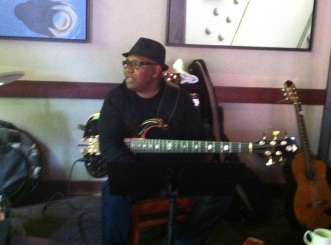
Victor Little
Besame Mucho (English: Kiss Me a Lot) is another old Spanish standard that has been covered by everybody. Written in 1940 by Consuelo Velasquez, a young Mexican woman who, at the time of the writing of the song, had never been kissed. From the Beatles to King Curtis to Herb Albert, it has been tossed around.
Under the Toshi treatment, it takes on a quality of desire that has not been seen before. There wasn't a lust in Toshi's version as much as an ache. Part of it is because he changed the key to D minor which completely changes the mood. The mood was almost spectral. There was a quality of reminiscence.
When Victor accepted the solo, he added to that whole sense even in his demeanor as he had a faraway look that made a person what he was remembering or dreaming or hoping. Toshi held down the melodic line through the whole solo and, when he resumed the lead, he punched in some jazzy turns as Victor walked it back alongside Reinhardt's brushwork.
Just when it looked like the song was going pretty straightforward to the end, Toshi became Segovia on LSD and kept up the twists without ever breaking the mood. Victor still had that faraway but contented look even as Reinhardt turned a whole new rhythm pattern that pushed the song past the 12 minute mark. It became a samba as Victor and Reinhardt punched up the rhythm section and Toshi evoked images of hot nights in Rio de Janiero. This was not the Besame Mucho that Paul McCartney crooned.
Victor then took part in some of Toshi's originals--Hypocrisy and When You Passed By-- and took to them like he had been playing them since childhood. From these to Agua de Beber, then to Black Orpheus which is a poweful piece. Reinhardt lays down a groove that Toshi and Victor easily fall into. A stirring, emotional experience. Reinhardt is the foundation of what transpires here in this song.
As I have written before, Reinhardt Melz is my favorite of all Portland drummers, maybe all drummers everywhere. He is without equal in drumming skill and rhythm. He also plays tonally, melodically. But like Toshi, there is a quality about the man himself that draws you. When he laughs, it is full-faced and contagious. When he concentrates, you find yourself listening for what it is that he is hearing. His movements are subtle. "Artistic," as my wife would say. There is a deep loyalty inside of him to the music, yes, but most especially to those with whom he performs. He refuses the spotlight when the spotlight does not advance the music and he makes room for others. Reinhardt and those with whom he associates seem to share the virtue of selflessness. In hearing Reinhardt perform or in hearing him speak, you learn something about him and you learn a lot about yourself.
With Victor Little sitting in, the give and receive of great musicians performing great music is a wonder to witness. Victor is a warm-hearted man whose smile and ease almost immediately draw you in and embrace you. He is a gentle man and a charming man.
To begin the last set, Toshi eased into Light in Shade. I realize that I have written a lot about this song. It has great depth and meaning for me and it energizes and encourages me with every hearing of it. Please indulge my going into it again because, with the addition of Victor's improvisational lines, it becomes something new yet again. In fact, during Victor's solo, Toshi could be heard in agreement with "Yeah-h-h-h-h!"
This song is like reaching enlightenment. There is a pull to the music that carries you further and further along until labor and effort cease and you are borne aloft simply by the melody. You stop actively listening and you fall into meditation. This melody is like a stream of joy and it remains even when the music has stopped. It is a changed life that is at the heart of this piece. Every time I hear it, I am not the same as before. Joy is created and enhanced and life is reborn once again.
The feeling continued into and through the two concluding numbers. Even an entire performance can be transformed by the beauty and harmony of one simple song. Toshi Onizuka's composing and performing are vehicles for transformation. I am changed everytime I listen with an open heart.
Toshi and Reinhardt are voiceless teachers. They teach with sound instead of words. This is what draws me back week after week.
Under the Toshi treatment, it takes on a quality of desire that has not been seen before. There wasn't a lust in Toshi's version as much as an ache. Part of it is because he changed the key to D minor which completely changes the mood. The mood was almost spectral. There was a quality of reminiscence.
When Victor accepted the solo, he added to that whole sense even in his demeanor as he had a faraway look that made a person what he was remembering or dreaming or hoping. Toshi held down the melodic line through the whole solo and, when he resumed the lead, he punched in some jazzy turns as Victor walked it back alongside Reinhardt's brushwork.
Just when it looked like the song was going pretty straightforward to the end, Toshi became Segovia on LSD and kept up the twists without ever breaking the mood. Victor still had that faraway but contented look even as Reinhardt turned a whole new rhythm pattern that pushed the song past the 12 minute mark. It became a samba as Victor and Reinhardt punched up the rhythm section and Toshi evoked images of hot nights in Rio de Janiero. This was not the Besame Mucho that Paul McCartney crooned.
Victor then took part in some of Toshi's originals--Hypocrisy and When You Passed By-- and took to them like he had been playing them since childhood. From these to Agua de Beber, then to Black Orpheus which is a poweful piece. Reinhardt lays down a groove that Toshi and Victor easily fall into. A stirring, emotional experience. Reinhardt is the foundation of what transpires here in this song.
As I have written before, Reinhardt Melz is my favorite of all Portland drummers, maybe all drummers everywhere. He is without equal in drumming skill and rhythm. He also plays tonally, melodically. But like Toshi, there is a quality about the man himself that draws you. When he laughs, it is full-faced and contagious. When he concentrates, you find yourself listening for what it is that he is hearing. His movements are subtle. "Artistic," as my wife would say. There is a deep loyalty inside of him to the music, yes, but most especially to those with whom he performs. He refuses the spotlight when the spotlight does not advance the music and he makes room for others. Reinhardt and those with whom he associates seem to share the virtue of selflessness. In hearing Reinhardt perform or in hearing him speak, you learn something about him and you learn a lot about yourself.
With Victor Little sitting in, the give and receive of great musicians performing great music is a wonder to witness. Victor is a warm-hearted man whose smile and ease almost immediately draw you in and embrace you. He is a gentle man and a charming man.
To begin the last set, Toshi eased into Light in Shade. I realize that I have written a lot about this song. It has great depth and meaning for me and it energizes and encourages me with every hearing of it. Please indulge my going into it again because, with the addition of Victor's improvisational lines, it becomes something new yet again. In fact, during Victor's solo, Toshi could be heard in agreement with "Yeah-h-h-h-h!"
This song is like reaching enlightenment. There is a pull to the music that carries you further and further along until labor and effort cease and you are borne aloft simply by the melody. You stop actively listening and you fall into meditation. This melody is like a stream of joy and it remains even when the music has stopped. It is a changed life that is at the heart of this piece. Every time I hear it, I am not the same as before. Joy is created and enhanced and life is reborn once again.
The feeling continued into and through the two concluding numbers. Even an entire performance can be transformed by the beauty and harmony of one simple song. Toshi Onizuka's composing and performing are vehicles for transformation. I am changed everytime I listen with an open heart.
Toshi and Reinhardt are voiceless teachers. They teach with sound instead of words. This is what draws me back week after week.
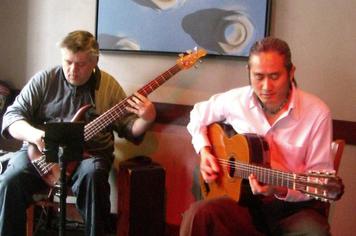
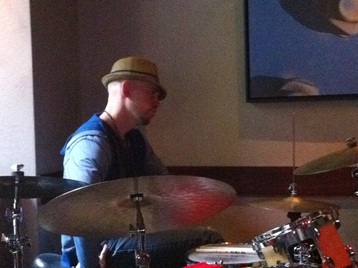
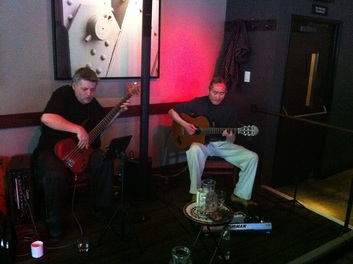
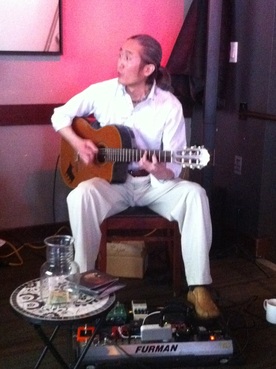
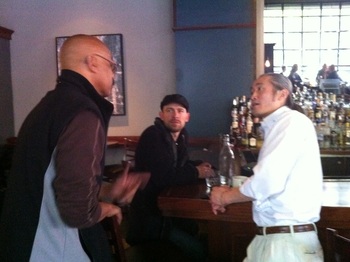
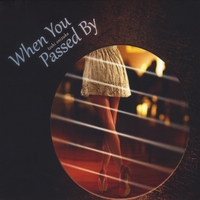
 RSS Feed
RSS Feed
